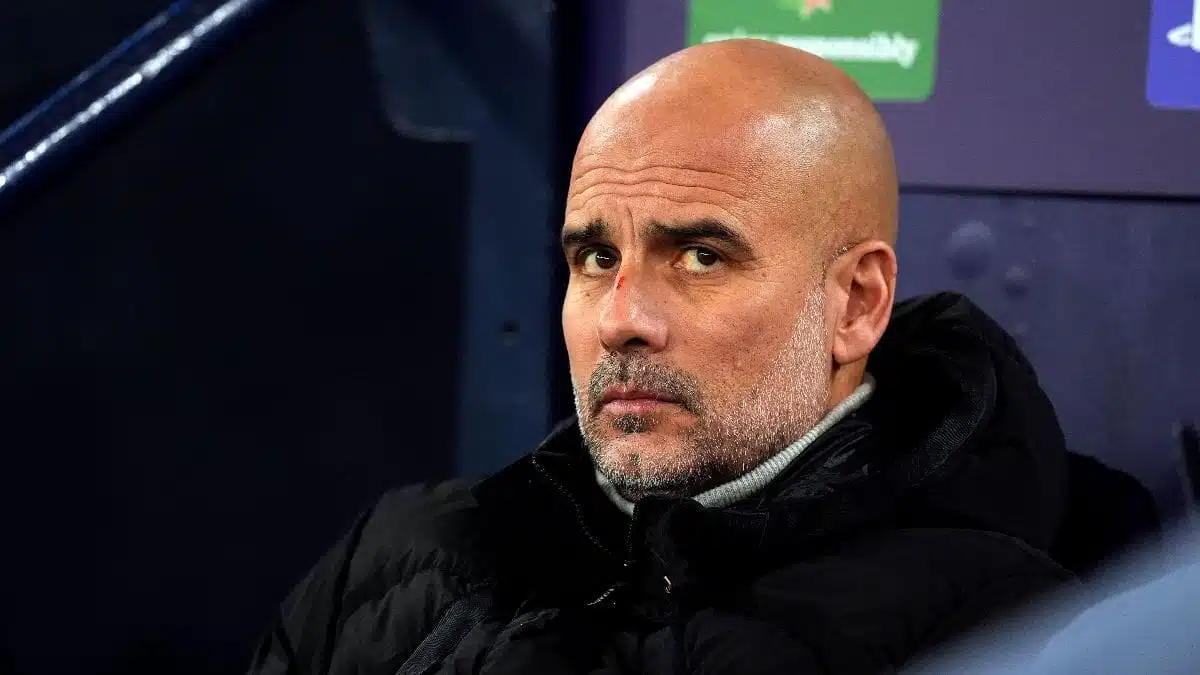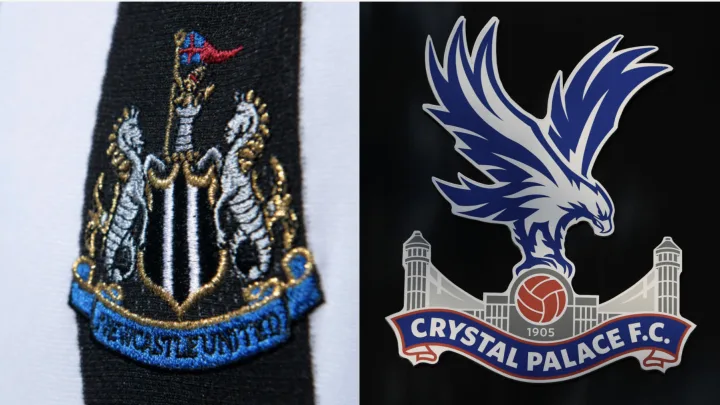By the supreme standards they have set under Pep Guardiola, Manchester City’s form represents a miserable plummet that continued apace with their fifth consecutive domestic defeat on Sunday.
Guardiola reminded Liverpool fans that he has won six English titles during his team’s 2-0 Premier League defeat at Anfield – a glorious run that had made a seven-game winless stretch unthinkable under his watch.
There are precedents for such a collapse, however. The Cityzens themselves are responsible for a bygone feat of nosediving that is yet to be repeated in England, while Liverpool and some of their other familiar title rivals, including Arsenal, Chelsea and Manchester United, have plumbed the depths the season after finishing top of the pile.
From cup shocks and sackings to dismal defeats in between European heroics, 101GreatGoals.com takes a look at City’s plight and some of the champions whose slumps swiftly became crises.
4 – Manchester City have lost four consecutive Premier League matches for the first time since August 2008. Meanwhile, this is the first time in Pep Guardiola’s managerial career that he has lost four consecutive league matches. Uncharted. pic.twitter.com/4K53ky6Zo7
— OptaJoe (@OptaJoe) December 1, 2024
📰 Table Of Contents
- 1 Manchester City, 1937/38
- 2 Chelsea, 2015/16
- 3 Ipswich Town, 1962/63
- 4 Leicester City, 2016/17
- 5 Manchester United, 2013/14
- 6 Blackburn Rovers, 1995/96
- 7 Aston Villa, 1981/82
- 8 Manchester City, 2024/25
- 9 Leeds United, 1974/75
- 10 Liverpool, 2020/21
- 11 Arsenal, 1991/92
- 12 Manchester City, 2012/13
- 13 Chelsea, 1955/56
Manchester City, 1937/38
Despite going on a run of one victory in 10 games between September and October, the 1936/37 season had been a famous one for City, winning the title for the first time and scoring 107 goals – almost twice as many as Manchester United, who were relegated.
Bragging rights moved across Manchester in spectacular fashion the following season, though, as a City side hindered by an early run of four defeats and a later eight-game drought went down, while United were promoted.
Boss Wilf Wild, who is the club’s longest-serving manager thanks to his 15-year reign, remained in charge until 1946. It is still the only occasion on which the English top-flight champions have been relegated the following season.
Chelsea, 2015/16
Jose Mourinho is the most successful manager in Chelsea’s history but his reputation for resembling the special one before going rotten at clubs really took off at the end of his second spell in charge.
Having beaten City to top spot by eight points in 2014/15, there were signs that the mood had soured at Stamford Bridge when Chelsea lost as many league games as they had in the previous season – three – during their opening five matches of the next campaign.
Jose Mourinho speaking about Chelsea just before they sacked him in 2015.
His words seem very relevant right now.#CFC #Sarripic.twitter.com/VfkcYLmQT5
— GiveMeSport Football (@GMS__Football) February 11, 2019
Chelsea lost seven and won two out of nine domestic games to hover a point clear of the bottom three before Mourinho was sacked in December, as well as going on a seven-game winless away run in England that included the end of their Carabao Cup title defence at Stoke City.
Guus Hiddink replaced Mourinho on an interim basis and more than steadied the ship, starting with a 15-game unbeaten league run to help Chelsea finish 10th. They won the league the following season under Antonio Conte.
Ipswich Town, 1962/63
Six years into his first managerial job, Sir Alf Ramsey had guided Ipswich to their first and only title in 1961/62, triumphing immediately after winning promotion from the second tier.
Ramsey left that October to manage England, with whom he would win the 1966 World Cup, but by then Ipswich were already in significant decline, winning one of their first six league games in 1962/63 following a 5-1 Charity Shield thrashing by Tottenham.
When Ramsey’s move was announced, Town were in the midst of a run of eight defeats and two wins in 15 league games. They finished four points above the relegation zone but, under Jackie Milburn, went down by the same number of points in 1963/64.
📺 “He was a great man, and you’ll never see his like again.”
A look back at 1962, as Sir Alf Ramsey guided Town to the First Division title.
💙 Thanks for everything, Sir Alf. #itfc pic.twitter.com/kBZH3FWH1x
— IPSWICH TOWN (@IpswichTown) January 22, 2020
Leicester City, 2016/17
A hangover seemed certain after Leicester completed one of the greatest shocks in sporting history by winning the 2015/16 Premier League, but this was a nasty one.
Claudio Ranieri will always be beloved in Leicester but the orchestrator of the club’s greatest season did not win away for more than 11 months, including 10 defeats and three draws on the road in the league at the start of 2016/17.
Leicester had lost seven on the spin when the Italian was sacked in February, with Craig Shakespeare guiding them to 12th after starting his tenure with six consecutive wins.
One of those came during their impressive debut Champions League campaign, which only ended with a 2-1 aggregate defeat to Atletico Madrid in the quarter-finals.
Manchester United, 2013/14
Manchester United’s first season after Sir Alex Ferguson’s retirement set the tone for a decade and counting without a serious challenge for top spot under a succession of ill-fated managers.
Departing after winning the club’s 20th title by 11 points ahead of City, Ferguson had given his blessing to successor David Moyes, who suffered defeats to Liverpool, Manchester City and West Brom during his first six matches.

The Reds and City both won 3-0 at Old Trafford in March, by which time United had been knocked out of the FA Cup by visitors Swansea City and the Carabao Cup via a penalty shootout at home to Sunderland.
A Champions League quarter-final exit to Bayern Munich was followed by a 2-0 home defeat that gaves Moyes’ former club, Everton, the double over United that season, spelling the end for the Scot.
Ryan Giggs took over as interim player-manager, winning seven points from 12 as the club finished outside the European places in seventh.
Blackburn Rovers, 1995/96
Helped by 34 goals from Alan Shearer and the financial backing of Jack Walker, Blackburn were the last surprise package before Leicester to win the Premier League when they triumphed for the first time since 1913/14 under Kenny Dalglish in 1994/95.
Dalglish’s assistant, Ray Harford, took over for the following season and oversaw seven defeats and one win in nine matches in August and September, including a flirtation with the relegation zone and the start of a doomed Champions League campaign.
🥅 PL Games: 138
⚽️ PL Goals: 112
🏆 94/95 Premier League Champions#OnThisDay in 1992, Alan Shearer joined Blackburn…@alanshearer | #BRFC pic.twitter.com/zIjtY6jvKs— The Sportsman (@TheSportsman) July 27, 2024
Blackburn did not win away in the league until January 13, losing seven on the road in the top flight along the way before rallying to finish two points off the top four in seventh. Dalglish and Harford both left that year and Rovers were relegated three seasons later.
Aston Villa, 1981/82
Villa fans worried by their side’s awful run in the Premier League might take comfort from the memorable extenuating circumstance when they lost as many games as they won in their title defence in 1981/82.
Ron Saunders endured six defeats in eight league matches before leaving the club after eight years in February, but he had put Villa on their way to glory in their maiden European Cup appearance, edging past German club BFC Dynamo on away goals after losing at Villa Park in the second round.
Successor Tony Barton’s role in leading Villa to 11th is entirely forgettable in the context of the cup run he continued, keeping clean sheets in each of their final five European encounters and shocking Bayern 1-0 in the final.
Under Unai Emery, Villa’s debut in the modern Champions League has started with five clean sheets and a 1-0 win over Bayern. Even the exacting Spaniard would surely accept midtable mediocrity in return for a repeat of the club’s finest hour.
In 1982, Aston Villa manager Ron Saunders shocked the football world when he resigned, just months after winning the league…
Sir Bobby Robson, his title rival with Ipswich Town, found out on live TV 👀
𝗦𝘂𝗽𝗲𝗿 𝗩𝗶𝗹𝗹𝗮𝗻𝘀 premieres tomorrow at 11pm on BT Sport 1 HD 🎬 pic.twitter.com/p3cSrrHWLq
— Football on TNT Sports (@footballontnt) May 17, 2022
Manchester City, 2024/25
In a comparison between certain teams we have named, Villa, say, might point to their reduced resources – they used 14 players to win the title in 1981 – while Guardiola would remind everyone about blistering schedules and the players he is operating without.
One of those is Ballon d’Or winner Rodri, the metronome without whom City’s statistics have always sunk. Kevin De Bruyne seems trapped in a perpetual struggle for fitness and John Stones has missed all but one half of their five defeats and a draw in six.
Should City go on to win trophies this season, it will be one of Guardiola’s greatest achievements because of the uniqueness of the challenge in his career. Their dreadful current run, though, will remain comparable with some of the worst on this list.
Leeds United, 1974/75
Unbeaten in the league until February in 1973/74, Leeds were top almost throughout on their way to the title during their final season before Don Revie left to manage England.
Revie enemy Brian Clough took over for a cinematised 44-day stay that ended just before his team turned around an opening run of one win in nine matches, and Jimmy Armfield oversaw one win in 11 domestic games towards the end of a season in which Leeds finished ninth.
On This Day 1974
Yorkshire TV Special
Goodbye Mr Clough (Full Version)
Brian Clough has been sacked by Leeds United after seven weeks as manager, hours later Clough is in the Yorkshire TV studio alongside his nemesis Don Revie to fathom out what went wrong.
Austin Mitchell with… pic.twitter.com/rkWBp0He4y— TV Football 1968-92 (@1968Tv) September 12, 2024
Their malaise in March and April mattered little as Armfield’s players beat Anderlecht and Barcelona over two-legged knockout ties in the European Cup, leading to an infamous 2-0 defeat to Bayern in the final at the Parc des Princes.
French referee Michel Kitabdjian’s decisions not to award penalties against Bayern legend Franz Beckenbauer remain highly contentious, and Leeds were banned from European competition for four years as a consequence of trouble in Paris after the game.
Liverpool, 2020/21
Liverpool had won the title earlier than any team in modern Premier League history in 2019/20, making the severeness of their subsequent loss of form all the more surprising.
A 7-2 hammering at Aston Villa seemed a freak result as the only defeat in their first 16 league games, but a six-game winless streak in December and January prefaced worse to come in February and March, when their six losses in seven matches included convincing home defeats by City and Everton.
𝗕𝗘𝗦𝗧 𝗢𝗙 𝟮𝟬/𝟮𝟭: Villa 7-2 Liverpool! 😍 pic.twitter.com/B6kVhSlEPl
— Aston Villa (@AVFCOfficial) June 8, 2021
Just when European qualification looked unlikely, Jurgen Klopp – whose bafflement in interviews had reflected the feelings of fans – saw his players win eight and draw two of their final 10 league matches to reach the Champions League in third. They were, however, comfortably knocked out by Real Madrid in the quarter-finals of that season’s competition.
Arsenal, 1991/92
George Graham’s Arsenal had lost one league game on their way to the second of his two titles at the club in 1990/91, only for three defeats and two draws to ground the Gunners in the bottom half of the table for the first seven matches of the following season.
Ian Wright’s arrival for a then club-record £2.5 million in September came as part of a marked upturn in fortunes, and there was little sign of the low point being around the corner when the legendary striker netted four of his 26 goals that season in a 4-2 home win over Everton in December.
Wright failed to score in his next eight appearances, but he was spared the embarrassment of being involved in Arsenal’s FA Cup third round defeat at fourth-tier Wrexham, which remains one of the greatest upsets ever in the competition and was part of an eight-match winless run.
They finished fourth – a position they would not better until Arsene Wenger’s arrival in 1996/97.
WELCOME TO WREXHAM PILOT EPISODE 🏴 Long before they were America’s favorite fifth-tier Welsh side, Wrexham pulled off one of the most famous #FACup upsets of all-time, beating Arsenal 2-1 back in 1992. pic.twitter.com/Ng7ADrbHnP
— Men in Blazers (@MenInBlazers) January 7, 2023
Manchester City, 2012/13
Guardiola has joked that there is some merit to opposition fans calling for him to be sacked, and perhaps his job could be under threat if he is judged on a single season’s work, as Roberto Mancini was by City in 2013.
Dismissing Mancini on the anniversary of Sergio Aguero’s last-gasp winner to seal the Premier League title for the Italian’s team, City said he had “failed to achieve any of the club’s targets, with the exception of qualification for next season’s Champions League”.
City’s Champions League points tally that season remains the lowest in history by an English club, drawing all of their home games and losing all three away against Ajax, Borussia Dortmund and Real Madrid.
They did not lose consecutive league games but finished 11 points behind Manchester United in second, lost the FA Cup final to relegated Wigan Athletic and were knocked out of the Carabao Cup by an Aston Villa team battling relegation.
Happy 52nd birthday to Roberto Mancini!!! #mcfc pic.twitter.com/yYdLiQv1qs
— Manchester City (@ManCity) November 27, 2016
Chelsea, 1955/56
Chelsea won the top flight for the first time in 1954/55 and their performance the following season might have served as a warning to supporters that it would be another 50 years before they repeated the trick.
Starting the season with five defeats and one win in nine league games, they proceeded to lose five in a row as part of a nine-match winless run in February and March, including a 4-0 mauling at Tottenham, a 5-0 battering at Burnley and a 3-0 defeat at West Brom.
The Blues did not even have the European Cup to enjoy after agreeing to FA pressure not to play in that season’s competition. They finished four points above the relegation zone and would come no higher than 11th during the subsequent seven years, including a season in the second tier in 1962/63.










